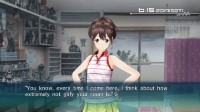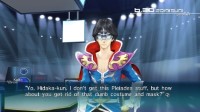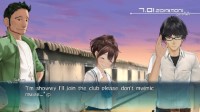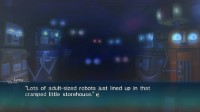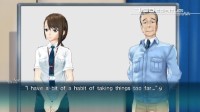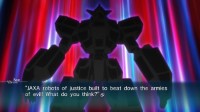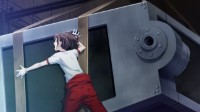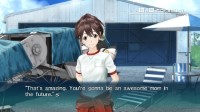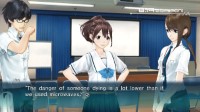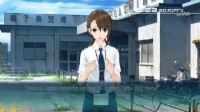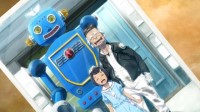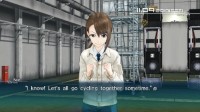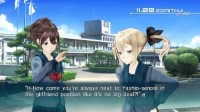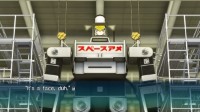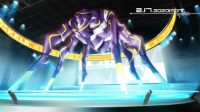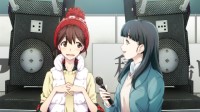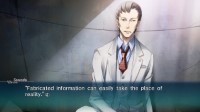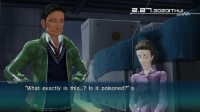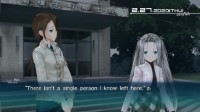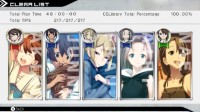Robotics;Notes Elite
Playtime: 48 Hours
Finished 25 January 2025.Played the Switch rerelease of this game. I originally bought it when it came out over 4 years ago, but didn't get very far until the last month - I was stuck at the beginning of the game for a really long time since it starts out super slowly, and the entire tourament arc in the beginning is kind of painful to get through. That said, I did watch the anime of this several years ago, so I didn't go into this blind - I more or less knew the overarching plot.
Note the Switch rerelease doesn't have any additional translation patches available, so all the original typos and aberrations in the script aren't corrected. That being said, even though I did notice a number of instances of awkward dialogue or stilted translation, it wasn't as major as people made it out to be, and I don't think it impacted my enjoyment very much. In general, particularly for foreign releases (of pretty much any media, really), it's reasonable to expect that English translations might seem a bit odd or inaccurate at times. There's always going to be an argument between translating for precision against translating to maintain a general vibe so this is really a discussion with no clear solution.
Compared to the other mainline Sci;Adv series entries, R;N feels like a much slower burn in pretty much every respect. Not only does it have a very long playtime, the story is linear, without branching routes unlike the Chaos games or Steins;Gate. On top of that, the intriguing parts of the plot are also introduced far slower than other games - Steins;Gate is also quite slow but gives you a taste of the worldline concepts pretty early on, while the Chaos; games throw you directly into the fire, both games opening with the main character immediately finding themselves at ground zero of a horrific murder. Meanwhile, I'd say the first half of R;N (at least) is almost entirely slice-of-life, minus some quickly-dismissed conspiracy theories.
To go a bit further, I feel like this game is a bit confused on what kind of subject matter it really wants to focus on. While of course the game is centered around giant robots, the centerpiece of the plot revolves around the conspiracy theory that Kaito uncovers over the course of the game, alongside the technology of this world, which is far more advanced than what was available in the other games. The problem is that none of it feels very well fleshed out - despite civilian robotics supposedly being very commonplace in this world, because the game is primarily set in Tanegashima, a small and rural island, none of it feels real. The giant robots that are built over the course of the game are also more or less sidelined, with the majority of the actual development being completely done behind the scenes, as Kaito doesn't really participate in its construction. Unlike "harder" science fiction stories, pretty much every technical detail of the robots that are built in this game are hand-waved away. Over the course of the story, the focus of the plot constantly flip-flops between a number different subjects and never really settles on any one of them. I almost forgot to mention here too - an in-universe fighting game (Kill-Ballad, often abbreviated KB for short) is of inordinate importance.
The directionlessness of the game can largely be attributed to the choice of protagonist - Kaito is probably the most "normal" of the Sci;Adv protagonists, compared to the awkwardness of Okabe & Takumi, but not necessarily in a good way. Put simply, a huge problem with this game is that, despite all of the different subjects it tries to introduce, Kaito doesn't really care about of any of it, instead only caring about playing KB at any and all times. When anything is happening with the GunBuild projects in the background, Kaito blows it off to play KB in the dunce corner. As the conspiracy theory gets deeper and deeper, he still views it as just a distraction from playing KB. I think he's a pretty realistic high schooler character, but it's a very strange and poor decision to write him as a character completely detached from the entire purpose of the game without doing much to draw him into the core of the plot until near the end. This is unlike C;H's Takumi, who obviously doesn't want to have anything to do with the murders, yet becomes a suspect about 2 hours into the game.
What's worse in my opinion is how much the story continues to jerk off the character, even given the fact that he doesn't care about anything. This is the aspect of the story that most clearly panders towards the target high-schooler demographic; that you (the player character) are needed and irreplacable for something big, so you'll reluctantly accept your heroic role. Kaito even completes the trope by randomly giving completely out-of-place grandstanding speeches to "inspire" people, despite doing fuck all the entire game - and the other club members actually manage to take a message from it for some reason, which feels completely unrealistic given how high schoolers usually work. The capstone on everything about Kaito as a character is how the writers went out of their way to give him a special superpower, and even make a pathetic to disguise it as an "affliction". Oh yeah, apparently he feels awful when he goes into slow-mo, but eventually he comes to resist the negative effects, and by the end of the game even has a handy device that can trigger it on demand! Meanwhile, they had to ensure that the other main character, Akiho, had to be extra useless, so they gave her the opposite power where she basically becomes a potato for 30 seconds, which of course has no utility whatsoever. I guess this is to make you feel cooler about yourself, but it's honestly unbelievably pathetic writing, and the fact that so much of the game revolves around one but not the other ends up making the entire concept feel amateurish - which is a pretty good description of the game as a whole in many respects.
So, as mentioned, Akiho is the "secondary" main character of the game, driving most of the plot surrounding the construction of the GunBuild giant robot projects (as far as this game is concerned). For whatever reason, the game tries its very hardest to make her seem as incompetent at possible at every turn to a laughable extent - despite being involved in the project for its entire lifespan (almost a decade) and single-handedly maintaining it at the beginning of the game, she is somehow miraculously unskilled in mechanics, being beaten out in practical understanding by someone who builds hobby robots (???) with no experience with heavy machinery. Also, despite all of that work, she can't go a single scene without some dumb gaffe or mistake. I'm not sure if it's supposed to be a poor attempt at comedy relief, a weird hero/main character complex of the writers towards Kaito, or just plain bad writing, but by all means her character should be far more competent and far more important than she actually is. As is, she's relegated to being more or less a cheerleader, even though the entirety of R;N should have been her story to begin with. It's a paradox; she's supposedly strong-willed, yet gets overruled by pretty much anyone else in a scene (Doc, Subaru, Kaito, etc.) if they have any other opinions. She's supposed to be the "dopey positive character" with no other distinguishing trait beyond being cheerful, yet needs to be comforted all the time - Mayuri didn't work well (at least for me) the first time, and Akiho is not a successful second try. I don't understand why the writing decides that all of Akiho's very real efforts in the story shouldn't amount to any useful knowledge or ability - by all accounts, her character would have been far better developed if she had a confidence issue but with very real abilities. As is, her character is written into a hole deeper than Tartarus, and she's still trying to get out in the sequel.
The rest of the Robotics Club is honestly kind of inconsequential and more or less one-note in this game. Since the characters are all high schoolers (to be fair), there's definitely an edge or a roughness and unlikeability to the characters that feels very real, and I can't consider that to be a weakness of writing in itself. All of these characters are outcasts in one way or another, after all. Subaru is the braggart that likes to think he's better and smarter than everyone else, pretending to be more mature and above others while clearly demonstrating he's not - he's kind of a stickler about everything, and yet his inflexibility adds a tension to the group dynamic that wouldn't be there otherwise. Junna is basically just the no-self-confidence character, and this extends to pretty much everything. She's afraid of robots and thinks she's useless for pretty much everything, which pretty much sums her up. That said, she does have a short arc that shows she's actually very good with children, and has great domestic ability. Frau is pretty much purely unlikeable, essentially Daru but somehow worse in every respect. While Daru straddled the line between bro and creepy terminally-online guy about half-half, Frau pretty much has no off switch. Even when the heat is on, pretty much all of her lines are terribly out-of-place, and whenever the game tries to give her a proper heartfelt moment, they shatter it with another dumb pervy line. I don't think she goes 5 lines in the game without mentioning BL or porn, and doesn't even talk about programming, which is the one thing she's supposedly good at.
Thankfully, Nae exists! Now grown up from the Steins;Gate days, she's now a JAXA employee that came to work at the space center at Tanegashima in part to establish ties with the Robot club for an internal JAXA initiative. Her energy is great in this game, with an interesting mix between being bubbly, yet kind of threatening and direct at times. I love how she developed along her own path apart from the S;G Labmems, yet has a number of clear nods to her childhood in Tokyo - it's really sweet how she took up biking as a result of her brief time with Suzuha. I've no doubt that she's my favorite character in the game.
Either way, the remainder of the plot once things get going is pretty neat, and a cool concept if a bit awkward in the way it tries to integrate the robot projects. Kimijima's conspiracy theory wild goose chase is a cool plotline, and the twist is also quite neat once you start to get an idea of what's going on. The EM radiation & visual projection technology is also pretty cool, but again, the connection of that to giant robots is a bit of a stretch, and the tech as a whole is not explained very well either and is mostly hand-waved away. I'll also say the brainwashing concepts aren't particularly well integrated into the plot either; blackmail of Misaki would make sense, but the brainwashing doesn't actually given the limits of what Kimijima can actually do in this game. Lastly, Kimijima's overall personality is pretty terribly written in this game, and feels more like a villain of the week than someone truly threatening - he likes to celebrate a lot before he accomplishes his goal.
Mechanically, this VN has a number of really interesting components that make it fun to "explore" the world. Like other games in the Sci;Adv series, there's a few extra layers of interaction that you get to have with the world and other characters. You always have access to a smartphone, from which you can access social media to chat with your friends and acquaintances - this is kind of like S;G, where the choices you make when responding to people will determine some routing choices later in the game - I'll get back to this in a moment. From the phone, you also have a map to get some context of the size of Tanegashima, and to clarify where everything is - I really liked this a lot, since the other games usually don't do a great job of this by default. And finally, many of the sequences where you end up playing KB actually require a brief QTE on your end (this is also linked to a very important decision later in the game), which is a fun, if not particularly deep, interaction.
Back to the branching plotline - so the entire game takes place in one long branch. There aren't multiple character routes along different non-canon worldlines as in Chaos;Head, and there's no concept of different worldlines as in S;G. Instead, all of the branching routes (Frau, Nae, Junna, Airi) happen during the story, but the game itself will jump between those chapters depending on what route you get. Basically, halfway through the game, there is a chance that you will see the middle 4 chapters chronologically out-of-order depending on your choices. This is such a strange and nonsensical decision, which was probably only made because of the "requirement" to have different character routes. Also notice that Subaru doesn't have one, even though his character could have definitely benefited from some maturation.
Overall, I appreciated the technical aspects of the game. Mechanically (as far as VN can be considered mechanical), the game has some very impressive features and interactivity in an otherwise linear story, and it manages to make 3D anime models work out quite well, all things considered. The story was also pretty interesting, even if it felt more hand-wavy and less cohesive than some other games in the series, and if the first half of it was a bit slow. That said, I very strongly feel that this game massively missed an opportunity to make Akiho the main character - the story really should have been hers to begin with, but we instead get to roleplay as a dude who doesn't give a shit about the entire core subject of the game. This really feels like it was written by a high-schooler for other high-schoolers given how amateur it is, and if I didn't already have some attachment to the characters (from previously watching the anime in university) and the series as a whole, I'm not sure if I would have made it through to the end.
